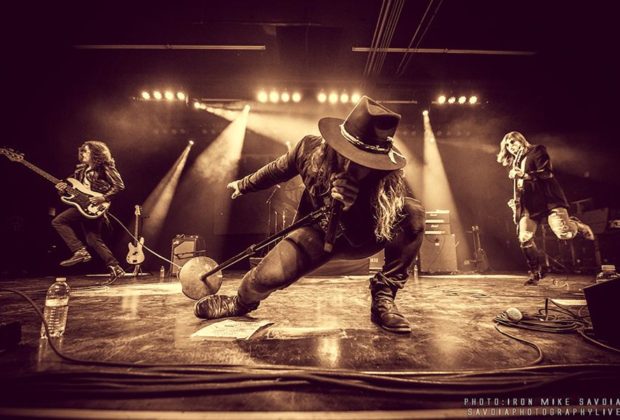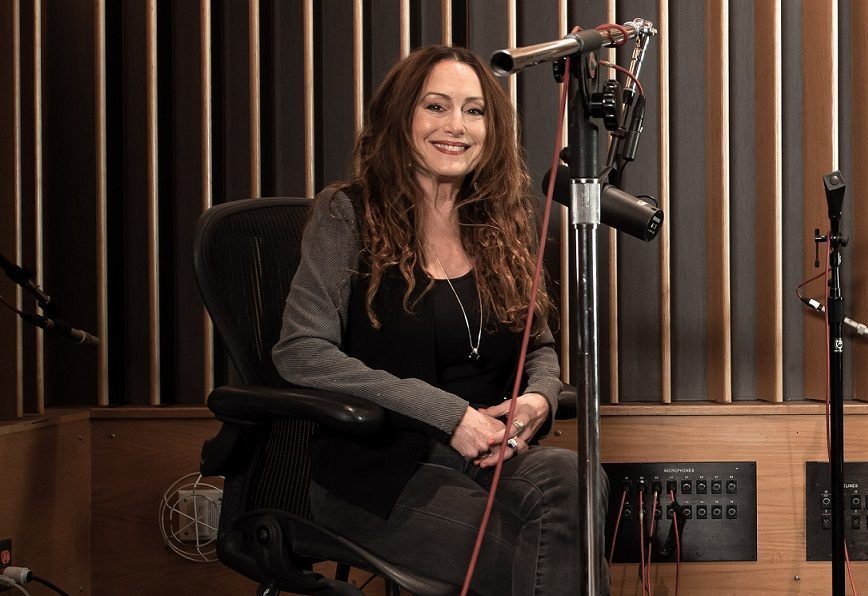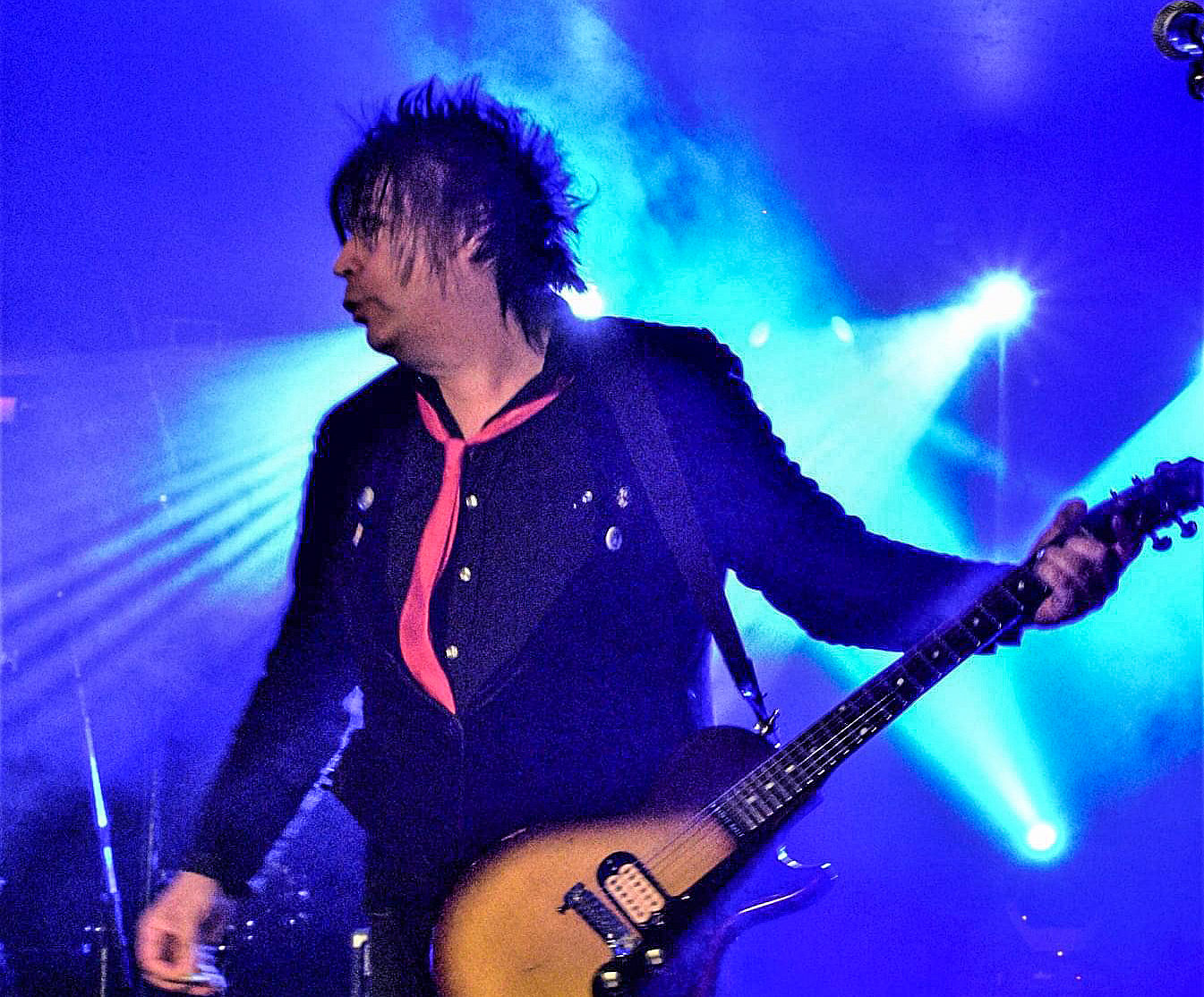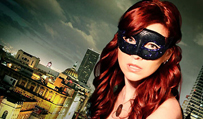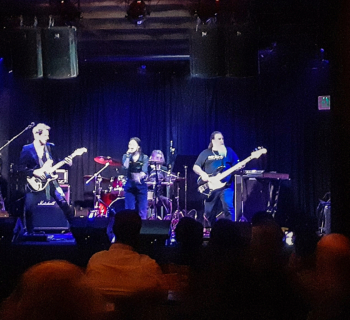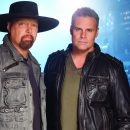2021 was a big year for Los Angeles-based blues rockers Dirty Honey. After releasing their debut EP in 2019 and following it up with a string of singles, they toured like crazy and opened for such high-profile names as the Who, Guns N’ Roses, Alter Bridge, and Slash. But this year has topped it all. First of all, they released their self-titled debut full length album and received mass acclaim. Then, they went out on tour with reformed soul brothers the Black Crowes, making a ton of friends along the way.
What they’ve achieved is miraculous, especially when considering the fact that they’re still without a record deal. They signed on with Mark DiDia’s Red Light Management in 2019, and that has turned out to be a masterstroke.
We caught up with vocalist Marc LaBelle and guitarist John Notto via Zoom shortly after the conclusion of the Crowes tour, and they’re clearly still buzzing….
Music Connection: A bit of background first––how and when did the band form? What was the mission?
Marc Labelle: I guess the official lineup happened somewhere in 2016/17. It’s kinda murky. I’d been playing with John and Justin [Smolian, bass] for quite a while already and we had his rotating musical chair of drummers for a couple of years. It wasn’t until Corey [Coverstone, drums] stood up at the drum set at a gig and said that he wanted to be in the band that, ok, we have our four guys now. Stylistically, the mission statement wasn’t really discussed until things got really serious.
We figured out “When I’m Gone” and we had to define a musical direction. I had always wanted to do a bluesy rock thing, because all my favorite bands are that. The Allman Brothers, Led Zeppelin, AC/DC and Aerosmith, the Black Crowes, the Stones––I love blues-based rock & roll––so I was pretty adamant about doing that. The other guys were intent on trying to push rock & roll forward in the way that maybe Muse had, introducing some electronic elements into the music. It wasn’t really my style and when people started gravitating towards “When I’m Gone” we all looked at each other and said, ‘This is easy, this is our lane, this is organic to us and authentic, so we should just do it and stop fighting ourselves.”
MC: So, do early demos exist where you are experimenting?
ML: I think there’s a song out, “Fire Away,” that a lot of people really love. It’s definitely missing that blues element to it, but it’s still a great song. I love it. There were a couple of other ones like that, that maybe had more Iron Maiden in there, or Muse. Other influences. So, we can definitely do that, and those exist.
MC: Who in the band is from L.A. and who moved to L.A.?
ML: Justin is the only one from L.A. I moved from New York, John moved from Maine, and Corey moved from Portland, Oregon.
MC: Does that affect the sound?
ML: Not so much New York. I didn’t really have much of a musical journey there. I love New York, it’s one of my favorite places in the world. But in terms of doing gigs and trying to make this thing work there, there’s no space there to play with a band and I realized that quickly.
MC: Since finding your lane, how do you think the sound has evolved?
ML: I think we have a definite sense of direction that helps when songwriting, and I think the evolution comes lyrically, musically. I think we’re looking on the next thing to get just a little bit more experimental. I think you always have to have some evolution. Specifically, what that is, I think that will come out in the studio. Maybe using the studio as more of a songwriting tool––I know we’ve all talked about that. The last two records, we did in about seven days in the studio. I think we’d like to have a month, just to see what we can discover in there, just playing around and being creative.
John Notto: I feel like we’re still on track for even more evolution. I feel, in a lot of ways, the first two records are one long thought. They’re not really that long, either. The first record is an extension of the EP, I think. So, in that sense, I look forward to whatever the next evolution is. I don’t think, with this unit, any evolution will be extreme. It’ll always be slight, I think. That’s the craft of it––to slightly twist it.
MC: It has all happened quite fast. Does it feel like a whirlwind from within?
ML: I think we all were ready for it and it was more exciting than anything. Certainly, COVID gave us a lot of time to reflect on what we’ve accomplished and what we’ve done, which was nice in a way. It was a pause button for everybody, to stop what would definitely have been a whirlwind year. We were on track for a lot of experiences to pass by or get lost in everything. I definitely feel more appreciative than anything, having been without music for the better part of 18 months. So, I try to pause myself while we’re in it a little bit, here and there.
JN: I thought that 2019/20 was a whirlwind for me. We went from playing first of three, $200 for the entire band, to selling out the El Rey after having opened for Guns N’ Roses, opened for the Who, meeting and touring with Slash, I definitely think that year was crazy. Every time we left L.A. and got in the van, we came back having achieved a little bit more. It was increments the whole way. It all happened so fast that when COVID did hit, that is the only time we got a chance to take a look at it.
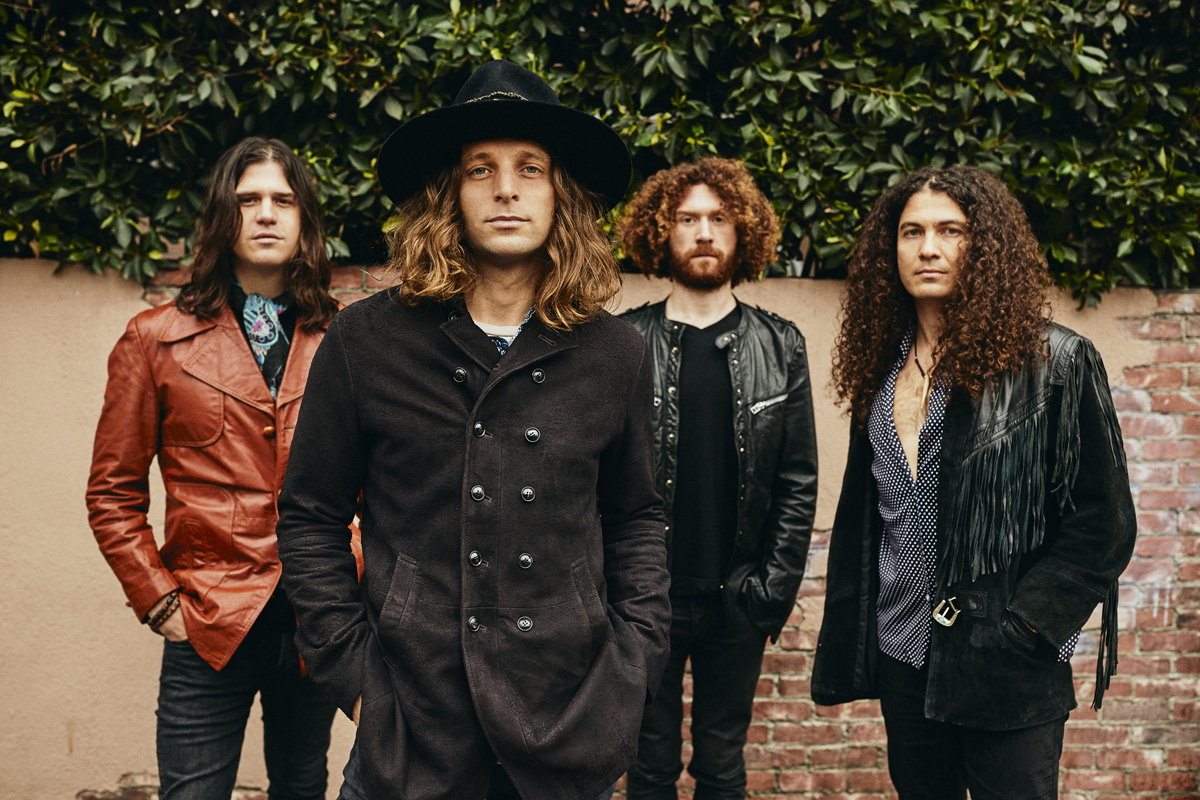
Dirty Honey, L-F: John Notto (guitar), Marc LaBelle (vocals), Corey Coverstone (drums), Justin Smolian (bass)
MC: How did you manage to do so much without label backing?
ML: We’re still without a label. That hasn’t changed. It’s really a testament to our manager and the great team that we have. They felt confident that we could achieve a lot without a label. Maybe reassess our label situation specifically after trying to get the music out to radio stations to streaming platforms and stuff, and see where we’re at. The success of ‘When I’m Gone’ helped clarify our belief in not needing a label, certainly for North America. Again, it’s a testament to the team and hopefully the music. People are responding to it.
MC: How was the Slash experience? Did you get to hang? Did he offer any advice?
JN: We did ten or 11 shows. We didn’t get to hang with him, like hang out in his dressing room and in his personal space. He was gracious enough to tell us how great he thought we were and how he felt that what we were doing stood out amongst the other bands coming out, and he was really excited about us in general. I unfortunately missed that speech.
ML: John was partying hard that night and missed that nugget of his hero telling him he’s a big fan of what he’s doing. Myles [Kennedy of Slash’s solo band plus Alter Bridge] is super good about letting us into his personal space. The way they set up everything at the gig is not amenable to just random opening bands walking in and saying hi to Slash. Myles is a little more chatty and very open. So is the rest of the band. Slash, I think, just wants to sit around and play his guitars.
MC: You’ve opened for the Who, Guns N’ Roses, and Alter Bridge too––what are the overriding memories from those experiences?
ML: With Guns, I was fortunate enough after the gig to spend a bit of time with Axl one on one, which was super unexpected and awesome. He was great. It was at the complete end of the tour, in Vegas, and management walked me to Axl. He was very nice and we chatted about normal stuff. Justin got to meet Pete Townshend, we all got to meet Roger Daltrey. That was amazing of course.
I think the memory that stood out the most––I remember being in Denver and John looked at me, when Myles Kennedy for the third time that night was like, “Give it up for Dirty Honey” on stage. John was like, “He really likes us.” That was only our third gig with them at the time, and then subsequently we went on tour with Alter Bridge and did more Slash dates. That was eye-opening for all of us. There’s a genuine appreciation coming from him about what we’re doing. That was a special moment for all of us.
MC: You’re a band based in Los Angeles, with long hair, but you’ve said that you don’t consider yourselves a “long-haired L.A. band.” Explain...
ML: I just think we didn’t really have anything to do with Hollywood or the Sunset Strip, specifically. By our own design. I actually had a conversation with Slash about it, a year and a half ago. He asked what it was like, coming up in L.A.? I was like, it wasn’t anything like what you had dude. We were not on the Strip, we never played The Whisky, we played The Viper Room for a digital online streaming show. We cut our teeth playing four hours in bars and clubs. Figured out some stuff that way. It was more financial for us than anything, because those venues on the Sunset Strip became so famous that they could force a band from Akron, Ohio to pay them a thousand dollars to hit that stage because that club’s name means something outside of L.A. We were looking at it as a local band. Playing The Whisky isn’t that big of a deal to us. We’d all been to a lot of shows where nobody was there.
MC: What do you think of the current state of rock & roll––in L.A., the USA, and globally?
JN: It’s definitely looking better than maybe it was five years ago. We pretty much know every band personally that is coming up in this new-school lane of doing it the way we do it. I don’t think any of us existed five years ago on the national scene. So that’s a good sign. They’re all out there working hard. We toured with Joyous Wolf––we’re friends with them and they’re really cool. We toured with Goodbye June, a cool southern rock band.
ML: Obviously, Greta Van Fleet is out there doing great. Marcus King is out there doing great. Badflower isn’t quite in the blusier lane, but they’re out there. So, it is happening. It’s healthy, but it’s not quite a movement yet, I don’t think.
MC: Where did you record the album and with whom?
JN: We recorded it at Henson Studios at Hollywood, California with our producer Nick DiDia. We did it over six days––it was quick. It was right in the heart of the pandemic, it was an in and out, wham bam thank you ma’am. More because of the scheduling, the timing and the rough year financially, I think we chose to go in really sure of what we were doing, and just be quick about it.
MC: If we take the single “The Wire” as an example––how did it start with the germ of an idea and then how do you build on it to completion?
JN: That one started on an acoustic guitar riff that I sent to Marc, then he was like “We should only do half of it,” and then we made it not acoustic anymore, and that’s the riff as it is, basically. Actually, I think around one of the tours we were doing, we were able to, once Marc got a vocal idea down, to start workshopping it as a band during soundchecks. That song grew over the course of that period of time. That’s actually the oldest song on the new record. So that seed was early 2019. But it was done the way it is for the Rolling 7’s tour in February 2020. But they are all different. It’s a different story for every one.
MC: Did the pandemic help or hinder the album?
ML: It helped us, for sure. We definitely made a better record than we would have, had it not happened. I think, lyrically, it created some challenges just because you weren’t living as much of a life as you normally would have been and experiencing various things to write about. There was nothing happening in society other than a social injustice movement that captivated a lot of people and really took over the news. So, you really had that and the pandemic that were happening on a social level, and nothing else.
JN: And I don’t really think that’s our schtick. To comment on the big, negative thing that’s happening that year. We definitely didn’t want to write about the pandemic. Your song stays forever, and for me personally, if you’re going to write a protesting kind of song, even if it’s sparked by a current subject, it’s got to be worded in such a way that it can be universal 50 years from now. If the mood strikes us, yeah. But I think we stay away from that stuff. So otherwise, we’re staying in our apartment watching Tiger King.
MC: How did the tour with the Black Crowes go? It seems like a great fit. Did you hang with them? What did you learn?
ML: They’re nothing but cool. We got to get pretty close with them over the last couple of months. They were kind enough to let us ride on the bus from New York to D.C. Chris [Robinson] was always telling us not to be scared to crash a Ferrari into the wall on the 405, let the chips fall where they may. Every band I’ve ever loved just absolutely obliterated their career at some point. Don’t be scared to take risks, do drugs and get tattoos, of course. Live a full life. He totally lives by this motto. He just lives life to the fullest. There’s no stopping that guy doing anything he wants to do. Which we all admire. More than anything, what I saw, from anybody we’ve played with, just be great every night. They truly were great every single night.
MC: What equipment do you each use and endorse?
JN: I was fortunate enough to meet the head of Gibson and establish a relationship with them. So, I have a couple of their standards, their starter guitars. I have my custom shop ‘58 reissue from ‘03. That’s my number one. I use that as often as possible. I’m kind of a one guitar guy. I don’t really desire to switch guitars a lot on stage. That’s not a problem right now, because I can’t afford it. Then I use my pedal board which isn’t very big––there’s about eight pedals on it. Then I use a 50 Watt Plexi reissue from 2018––that’s Marshall. It’s a 4X12.
I think for the next tour I’m going to use my spare head as my solo head. Click it on for solos. The real goal with that isn’t really to be louder. It does feel better to push more air. But what I really love the most about it is not using a pedal for any overdrive. I’d much rather click on another amp that’s just really saturated. I like amp tone more than I like pretty much any pedal tone, if you’re talking about overdrive with distortion. I’m excited to add that extra thing. That’s something Isaiah Mitchell did with the Black Crowes. He ran a Magnatone the entire time, and then for solos he just clicked on a switcher and added an Orange.
I try to keep it real simple. I might mess with an effects loop, because I hear if you put your delays and your reverbs in there it’s just a little more pristine.
ML: I admittedly am not much of a guitar player, but I like to write and try to get inspired. I’ve always loved Jon’s ’58 Les Paul. It’s still the best guitar I’ve ever picked up. When I got home, a Bluesbreaker Marshall just showed up that I still haven’t been able to plug in, because I live in an apartment complex. You can’t really play it quiet. I’ve got another 25 Watt Marshall that showed up. Trying to accumulate some things that can help me write.
JN: Justin has two basses. He got one from Gibson––a Firebird bass. It’s the only lefty they ever made. He uses an Aguilar Tone Hammer, I think. Just a 2x12 cabinet right now. Before the Firebird, he’d been using a custom-made bass by Seth Lee Jones from Tulsa, just somebody he knew.
ML: Corey uses DW drums. I believe it’s a jazz series.
MC: Finally, what’s next for the band?
ML: There’s some big news coming. We’re going out with Wolfgang Van Halen in January and February. That should be cool. Then we’re going to Europe for the first time, and maybe some sort of a Canadian run. But next summer will be all Europe all the time.
JN: I think we’ll push one more single from the record, but right now we’re focusing on “The Wire.”
Contact Heidi Ellen Robinson Fitzgerald
818-705-1267, [email protected]

